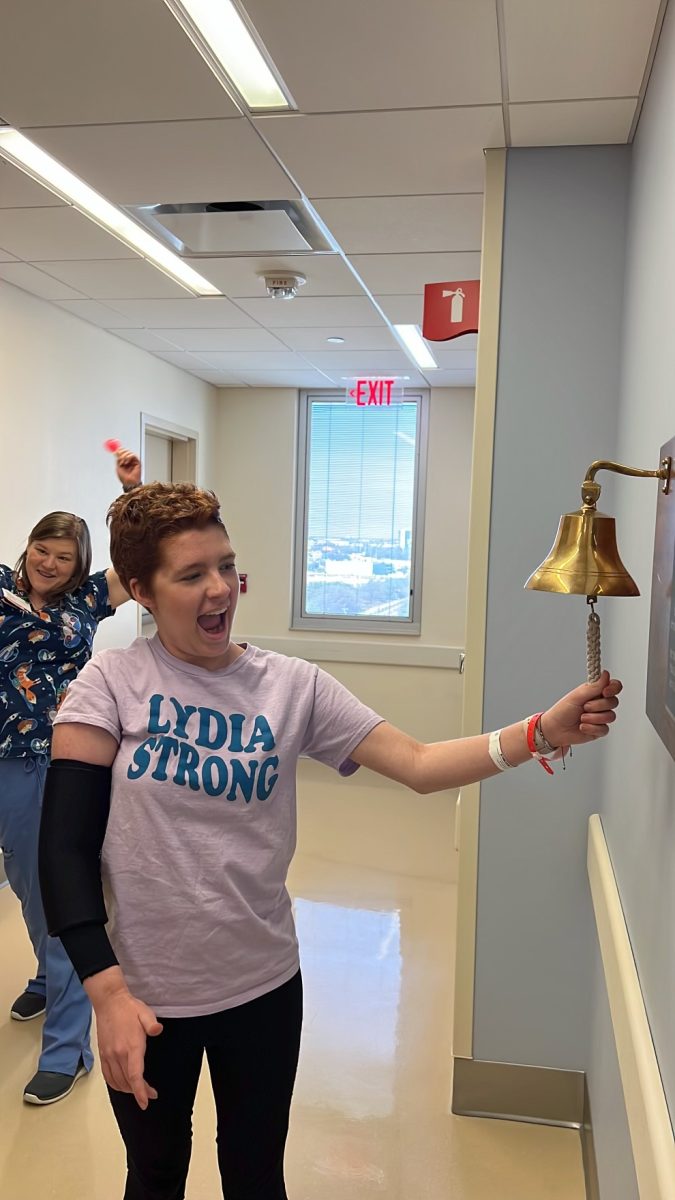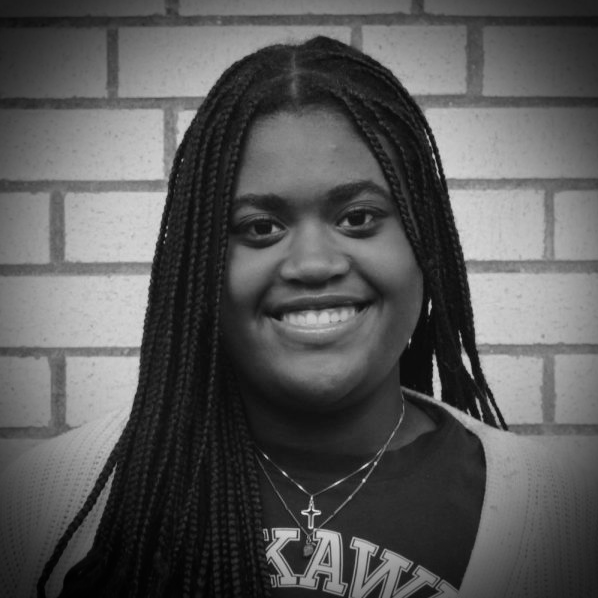As a visit to her grandmother’s Illinois house comes to an end, junior Lydia Hood catches her mother’s eye when they board the plane.
“That’s a cute top,” her mom says.
But the patterns of Lydia’s tank top weren’t the only thing she noticed.
A softball-sized mass had formed near her chest. A mass that would soon grow to the size of her fist within the span of a few days.
Lydia’s parents rushed her to the hospital. The minutes before the doctors delivered their diagnosis felt excruciating, but not as much as when they found out what the doctors detected.
A tumor was growing on a nerve near her right arm. The pain and discomfort Lydia felt for nine months turned out to be cancer.
***
When Lydia was three years old, she was diagnosed with Neurofibromatosis, a condition that causes tumors to grow all over the nerves in the brain and body. Battling brain tumors on and off throughout her whole life prepared her for the impending surgeries in her cancer journey.
Lydia’s initial treatment plan included 12 rounds of chemotherapy and several rounds of surgery. When the doctors became aware of how large her tumor grew, they realized radiation was the safest way to shrink the tumor without permanently damaging nerves or tissue. During her treatment journey, Lydia underwent six months of rigorous chemotherapy.
The surgery and treatment process seemed extensive. Surgeons removed a nerve from her shoulder and replaced it, leaving her unable to fully lift her arm above her head or move as much as she used to. However, she is grateful for the mobility that remains. The thought of still having some movement in her arm gives her hope and keeps her motivated for recovery going forward.
“Honestly, it’s a blessing I can even move my arm at all,” Lydia said. “I’m very thankful for everything I still have, even though it could be better, I have something.”
The most important thing to Lydia was her family’s support during her treatment process. Lydia’s family members rallied around her, even though it wasn’t easy for them.
“Everyone knew how I fought it before and that I’d be able to fight it again, so they all supported me and carried me through this process,” Lydia Hood said.
When Lydia’s dad, teacher Jesse Hood, found out she was diagnosed with cancer, he didn’t know what to think. A load of negative thoughts came rushing to his mind.
“When I first heard of cancer, I didn’t know what to think,” Hood said. “The first thing in my mind was, it could be saying goodbye to her.”
While Lydia was receiving treatments, it was difficult for her family to sit and watch on the sidelines, waiting for their daughter to get better. While in treatment, her dad saw her health rapidly decline. Seeing his daughter cry, and getting sick in the mornings brought emotional pain to his life. During the process he struggled with mental health, but he worked to remain strong for his daughter and family.
“You feel so helpless for your child,” Hood said. “I’m always the go-to person for answers, and this time I didn’t have answers.”
As weeks of Lydia’s treatments passed, her hair fell off bit by bit. Lydia had been wearing beanies and head scarves to make it more comfortable. Though she felt scared, she built up the courage to say, “Dad, I just want to cut it.”
That same night her dad shaved her hair. What started as an emotional time for both of them ended in relief and made them closer.
Hood was more than willing to be there for Lydia at every step of the way. He and his wife switched shifts in the hospital with Lydia, staying up late as needed. With the help of substitute teachers, family, and fellow staff members, he was able to be present for his daughter.
“I almost wanted to take the pain for her,” Hood said. “I wished I could’ve been going through this instead of her. I wanted to be there and live it as much as possible for her, even though I couldn’t.”
After surgery, Lydia was most excited about returning back to school. Since she was little, she’s always enjoyed the school environment.
“It was hard not being able to go to school,” Lydia Hood said. “Once I thought about it, I didn’t realize how much I loved something until I couldn’t have it anymore.”
She is very thankful to her teacher, Holly Soape, who homeschooled Lydia throughout her treatment so she could graduate with her class. Soape is the homebound teacher for LISD.
Compared to a regular district schedule, Mrs. Soape only had 4 hours a week to teach Lydia, while the average school student had 40. Through collaboration and teamwork, she taught subjects she had never taught before, and was able to create a schedule for Lydia while being in the hospital. Soape said everyday she came in and taught Lydia, she would always be learning with the utmost happiness, despite the challenges she was facing at the time.
“Lydia never has a bad day,” Soape said. “She always meets you smiling.”
As of now, she is still dealing with the ups and downs of recovery and taking things one day at a time to get back in the groove. Lydia was looking forward to being able to attend football games, go to pep rallies, and perform in the school band – a staple in her life. Now that she doesn’t have full movement in her arm, she plays the synthesizer – a keyboard that controls sounds and audio during performances.
“Even though band has to be different due to my arm, I am so happy to be back,” Lydia said. “I’m happy to be able to do the things I love again.”
Throughout Lydia’s treatment the student body, faculty, and the band have all shown her nothing but support. The Flower Mound community showered her with care post-op and throughout her journey battling tumors, including giving her gifts and letters that she still keeps today.
One of her favorite memories was the day her bandmates at both Marcus and Flower Mound High School showed up to her house and performed a parade for her. The overwhelming display of love from students and staff encouraged her to keep pushing and be strong through her tough battle.
“People just being there for me made me get through it,” Lydia said. “Seeing the nurses, the service animals, and everyone I made a good relationship with made hospital visits easier.”
Throughout her journey with treatment and tumors, her and her fathers best advice is to always lean on the community around you. It’s not easy going through the process alone. Lydia advises everyone going through similar situations to stay hopeful and strong.
“Thank you to everyone who supported me,” Lydia said. “Thank you to everyone who made a difference in my life and made this journey possible for me.”







